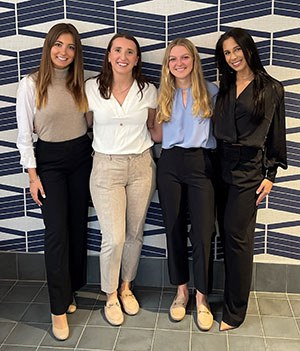Penn State Team Wins Boston College Case Competition

A team of four Penn State Smeal College of Business students teamed up recently to win the fourth annual Boston College 2022 Corcoran Center Case Competition held by the Boston College Joseph E. Corcoran Center for Real Estate and Urban Action.
Emma Shaw, senior – finance; Alycia Fournier, senior – risk management; Lauren Knopf, junior – finance; and Hope Urbanovsky, sophomore – corporate innovation and entrepreneurship; whose team name was LEAH Development, produced the winning presentation from among 31 teams representing 14 colleges and universities. The Smeal team won the top prize of $5,000.
A Boston College team placed second and won $2,500, followed by Indiana in third ($1,500) and another Boston College team in fourth, which received an honorable mention.
Teams were asked to come up with the best plan for a mixed-income housing development in Madison, Wisconsin, using the federal low-income housing credits as one tool of financing.
The competition started with a pair of workshops that served as an introduction to federal housing policies in the United States, along with the pressing need for more affordable housing resources and entrepreneurs in the industry.
A week later, the case was unveiled, based on a real-world development project in Madison, which is contending with a significant shortage of affordable housing triggered in large part by large numbers of college students and various employers.
The teams handed in first-round submissions, including a written narrative and Excel workbook. At that point, a panel of judges moved forward with four finalists. Those teams then had the opportunity to work with an expert consultant to revise their initial proposals and craft a 15-minute oral presentation.
Steve Bisbee, adjunct instructor of risk management, served as the team’s adviser.
